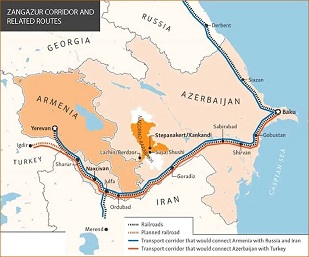Russia, Iran, Israel, America and Turkey competed in the Caucasus, and Armenia lost Nagorno-Karabakh
Elijah J Magnier
Nestled in the Caucasus, the Nagorno-Karabakh region is a living emblem of global geopolitics. Far from being a simple territorial dispute between Armenia and Azerbaijan, the region is a nexus where the strategic aspirations of Russia, Iran, Israel, America and Turkey intersect. Armenia’s struggle with the loss of Nagorno-Karabakh reveals a broader narrative that involves not just land, but a maze of strategic pathways, alliances and geopolitical moves. While some see the conflict as rooted in ethnicity, others see a struggle for key corridors that could potentially separate Iran from Armenia and bolster Turkey’s influence in Eurasia. The geopolitical stakes are high: Armenia’s NATO aspirations are opposed by Russia, Iran and Turkey; European interests are at stake; and Israel’s prominent role in Azerbaijan makes Iran wary. With Russia and Turkey promoting corridors that could further marginalise Iran in the South Caucasus, the search for a lasting peace between Armenia and Azerbaijan remains challenging, with the prevailing tensions serving the interests of several global actors.
Under Russian guidance, Armenian officials in Nagorno-Karabakh recently signed a deal with Azerbaijan that has yet to be finalised. The pact will see them become a minority but still Azerbaijani citizens and integrate into Azerbaijani society, a significant change after the 24-hour attack. After years of intense conflict, Baku is now asserting its dominance over the disputed region. But the underlying crisis between Armenia and Azerbaijan is far from resolved.

























